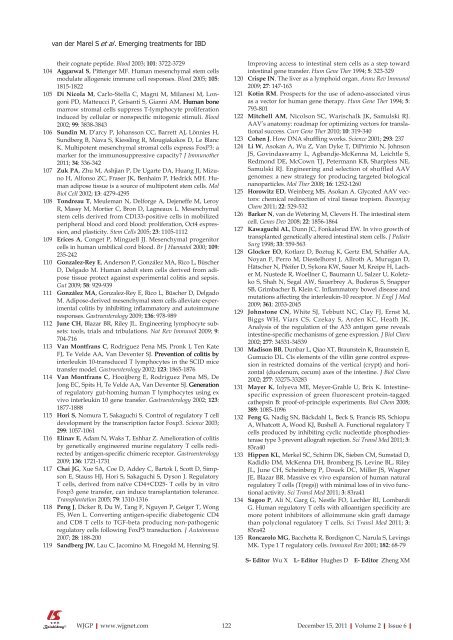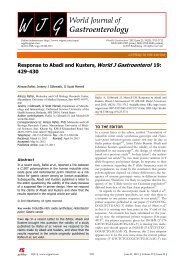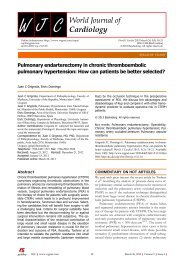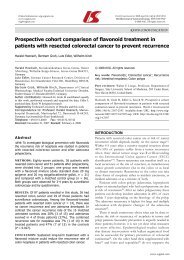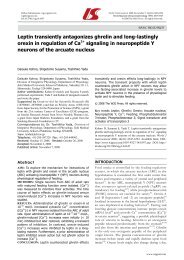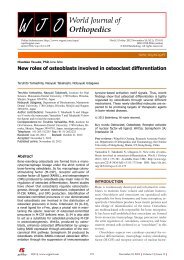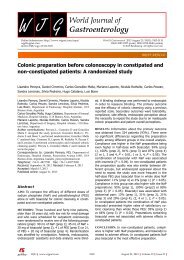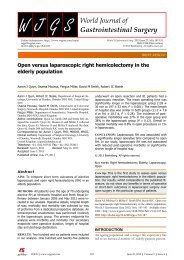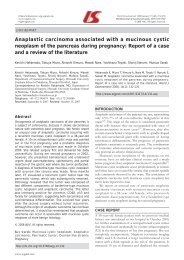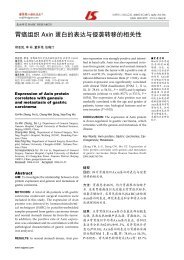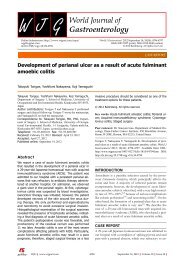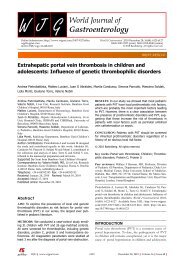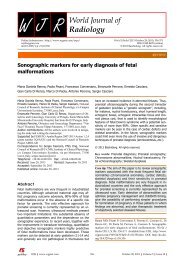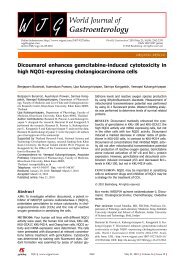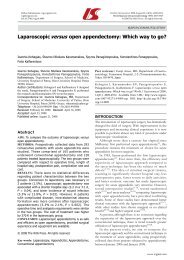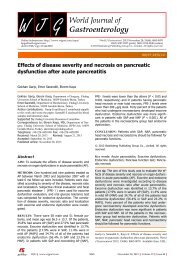World Journal of Gastrointestinal Pathophysiology
World Journal of Gastrointestinal Pathophysiology
World Journal of Gastrointestinal Pathophysiology
You also want an ePaper? Increase the reach of your titles
YUMPU automatically turns print PDFs into web optimized ePapers that Google loves.
van der Marel S et al . Emerging treatments for IBD<br />
their cognate peptide. Blood 2003; 101: 3722-3729<br />
104 Aggarwal S, Pittenger MF. Human mesenchymal stem cells<br />
modulate allogeneic immune cell responses. Blood 2005; 105:<br />
1815-1822<br />
105 Di Nicola M, Carlo-Stella C, Magni M, Milanesi M, Longoni<br />
PD, Matteucci P, Grisanti S, Gianni AM. Human bone<br />
marrow stromal cells suppress T-lymphocyte proliferation<br />
induced by cellular or nonspecific mitogenic stimuli. Blood<br />
2002; 99: 3838-3843<br />
106 Sundin M, D’arcy P, Johansson CC, Barrett AJ, Lönnies H,<br />
Sundberg B, Nava S, Kiessling R, Mougiakakos D, Le Blanc<br />
K. Multipotent mesenchymal stromal cells express FoxP3: a<br />
marker for the immunosuppressive capacity? J Immunother<br />
2011; 34: 336-342<br />
107 Zuk PA, Zhu M, Ashjian P, De Ugarte DA, Huang JI, Mizuno<br />
H, Alfonso ZC, Fraser JK, Benhaim P, Hedrick MH. Human<br />
adipose tissue is a source <strong>of</strong> multipotent stem cells. Mol<br />
Biol Cell 2002; 13: 4279-4295<br />
108 Tondreau T, Meuleman N, Delforge A, Dejeneffe M, Leroy<br />
R, Massy M, Mortier C, Bron D, Lagneaux L. Mesenchymal<br />
stem cells derived from CD133-positive cells in mobilized<br />
peripheral blood and cord blood: proliferation, Oct4 expression,<br />
and plasticity. Stem Cells 2005; 23: 1105-1112<br />
109 Erices A, Conget P, Minguell JJ. Mesenchymal progenitor<br />
cells in human umbilical cord blood. Br J Haematol 2000; 109:<br />
235-242<br />
110 Gonzalez-Rey E, Anderson P, González MA, Rico L, Büscher<br />
D, Delgado M. Human adult stem cells derived from adipose<br />
tissue protect against experimental colitis and sepsis.<br />
Gut 2009; 58: 929-939<br />
111 González MA, Gonzalez-Rey E, Rico L, Büscher D, Delgado<br />
M. Adipose-derived mesenchymal stem cells alleviate experimental<br />
colitis by inhibiting inflammatory and autoimmune<br />
responses. Gastroenterology 2009; 136: 978-989<br />
112 June CH, Blazar BR, Riley JL. Engineering lymphocyte subsets:<br />
tools, trials and tribulations. Nat Rev Immunol 2009; 9:<br />
704-716<br />
113 Van Montfrans C, Rodriguez Pena MS, Pronk I, Ten Kate<br />
FJ, Te Velde AA, Van Deventer SJ. Prevention <strong>of</strong> colitis by<br />
interleukin 10-transduced T lymphocytes in the SCID mice<br />
transfer model. Gastroenterology 2002; 123: 1865-1876<br />
114 Van Montfrans C, Hooijberg E, Rodriguez Pena MS, De<br />
Jong EC, Spits H, Te Velde AA, Van Deventer SJ. Generation<br />
<strong>of</strong> regulatory gut-homing human T lymphocytes using ex<br />
vivo interleukin 10 gene transfer. Gastroenterology 2002; 123:<br />
1877-1888<br />
115 Hori S, Nomura T, Sakaguchi S. Control <strong>of</strong> regulatory T cell<br />
development by the transcription factor Foxp3. Science 2003;<br />
299: 1057-1061<br />
116 Elinav E, Adam N, Waks T, Eshhar Z. Amelioration <strong>of</strong> colitis<br />
by genetically engineered murine regulatory T cells redirected<br />
by antigen-specific chimeric receptor. Gastroenterology<br />
2009; 136: 1721-1731<br />
117 Chai JG, Xue SA, Coe D, Addey C, Bartok I, Scott D, Simpson<br />
E, Stauss HJ, Hori S, Sakaguchi S, Dyson J. Regulatory<br />
T cells, derived from naïve CD4+CD25- T cells by in vitro<br />
Foxp3 gene transfer, can induce transplantation tolerance.<br />
Transplantation 2005; 79: 1310-1316<br />
118 Peng J, Dicker B, Du W, Tang F, Nguyen P, Geiger T, Wong<br />
FS, Wen L. Converting antigen-specific diabetogenic CD4<br />
and CD8 T cells to TGF-beta producing non-pathogenic<br />
regulatory cells following FoxP3 transduction. J Autoimmun<br />
2007; 28: 188-200<br />
119 Sandberg JW, Lau C, Jacomino M, Finegold M, Henning SJ.<br />
WJGP|www.wjgnet.com<br />
Improving access to intestinal stem cells as a step toward<br />
intestinal gene transfer. Hum Gene Ther 1994; 5: 323-329<br />
120 Crispe IN. The liver as a lymphoid organ. Annu Rev Immunol<br />
2009; 27: 147-163<br />
121 Kotin RM. Prospects for the use <strong>of</strong> adeno-associated virus<br />
as a vector for human gene therapy. Hum Gene Ther 1994; 5:<br />
793-801<br />
122 Mitchell AM, Nicolson SC, Warischalk JK, Samulski RJ.<br />
AAV’s anatomy: roadmap for optimizing vectors for translational<br />
success. Curr Gene Ther 2010; 10: 319-340<br />
123 Cohen J. How DNA shuffling works. Science 2001; 293: 237<br />
124 Li W, Asokan A, Wu Z, Van Dyke T, DiPrimio N, Johnson<br />
JS, Govindaswamy L, Agbandje-McKenna M, Leichtle S,<br />
Redmond DE, McCown TJ, Petermann KB, Sharpless NE,<br />
Samulski RJ. Engineering and selection <strong>of</strong> shuffled AAV<br />
genomes: a new strategy for producing targeted biological<br />
nanoparticles. Mol Ther 2008; 16: 1252-1260<br />
125 Horowitz ED, Weinberg MS, Asokan A. Glycated AAV vectors:<br />
chemical redirection <strong>of</strong> viral tissue tropism. Bioconjug<br />
Chem 2011; 22: 529-532<br />
126 Barker N, van de Wetering M, Clevers H. The intestinal stem<br />
cell. Genes Dev 2008; 22: 1856-1864<br />
127 Kawaguchi AL, Dunn JC, Fonkalsrud EW. In vivo growth <strong>of</strong><br />
transplanted genetically altered intestinal stem cells. J Pediatr<br />
Surg 1998; 33: 559-563<br />
128 Glocker EO, Kotlarz D, Boztug K, Gertz EM, Schäffer AA,<br />
Noyan F, Perro M, Diestelhorst J, Allroth A, Murugan D,<br />
Hätscher N, Pfeifer D, Sykora KW, Sauer M, Kreipe H, Lacher<br />
M, Nustede R, Woellner C, Baumann U, Salzer U, Koletzko<br />
S, Shah N, Segal AW, Sauerbrey A, Buderus S, Snapper<br />
SB, Grimbacher B, Klein C. Inflammatory bowel disease and<br />
mutations affecting the interleukin-10 receptor. N Engl J Med<br />
2009; 361: 2033-2045<br />
129 Johnstone CN, White SJ, Tebbutt NC, Clay FJ, Ernst M,<br />
Biggs WH, Viars CS, Czekay S, Arden KC, Heath JK.<br />
Analysis <strong>of</strong> the regulation <strong>of</strong> the A33 antigen gene reveals<br />
intestine-specific mechanisms <strong>of</strong> gene expression. J Biol Chem<br />
2002; 277: 34531-34539<br />
130 Madison BB, Dunbar L, Qiao XT, Braunstein K, Braunstein E,<br />
Gumucio DL. Cis elements <strong>of</strong> the villin gene control expression<br />
in restricted domains <strong>of</strong> the vertical (crypt) and horizontal<br />
(duodenum, cecum) axes <strong>of</strong> the intestine. J Biol Chem<br />
2002; 277: 33275-33283<br />
131 Mayer K, Iolyeva ME, Meyer-Grahle U, Brix K. Intestinespecific<br />
expression <strong>of</strong> green fluorescent protein-tagged<br />
cathepsin B: pro<strong>of</strong>-<strong>of</strong>-principle experiments. Biol Chem 2008;<br />
389: 1085-1096<br />
132 Feng G, Nadig SN, Bäckdahl L, Beck S, Francis RS, Schiopu<br />
A, Whatcott A, Wood KJ, Bushell A. Functional regulatory T<br />
cells produced by inhibiting cyclic nucleotide phosphodiesterase<br />
type 3 prevent allograft rejection. Sci Transl Med 2011; 3:<br />
83ra40<br />
133 Hippen KL, Merkel SC, Schirm DK, Sieben CM, Sumstad D,<br />
Kadidlo DM, McKenna DH, Bromberg JS, Levine BL, Riley<br />
JL, June CH, Scheinberg P, Douek DC, Miller JS, Wagner<br />
JE, Blazar BR. Massive ex vivo expansion <strong>of</strong> human natural<br />
regulatory T cells (T(regs)) with minimal loss <strong>of</strong> in vivo functional<br />
activity. Sci Transl Med 2011; 3: 83ra41<br />
134 Sagoo P, Ali N, Garg G, Nestle FO, Lechler RI, Lombardi<br />
G. Human regulatory T cells with alloantigen specificity are<br />
more potent inhibitors <strong>of</strong> alloimmune skin graft damage<br />
than polyclonal regulatory T cells. Sci Transl Med 2011; 3:<br />
83ra42<br />
135 Roncarolo MG, Bacchetta R, Bordignon C, Narula S, Levings<br />
MK. Type 1 T regulatory cells. Immunol Rev 2001; 182: 68-79<br />
S- Editor Wu X L- Editor Hughes D E- Editor Zheng XM<br />
122 December 15, 2011|Volume 2|Issue 6|


